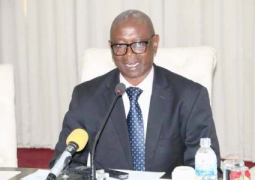The Department of Social Welfare and UNICEF organized an Intergenerational Dialogue on Saturday 14th July 2012 at the Kanifing Municipal Council Chambers Hall. The event was a follow-up activity to the National launching of UNICEF’s flagship report, State of the World’s Children 2012: Children in an Urban World, launched by the Minister of Health, on behalf of the Vice President of The Gambia.
The launching provided an opportunity to open dialogues at national level on the way forward in responding to issues of disparity and inequity in access to basic social services for some children living in poor urban communities in The Gambia, which consequently deprives them of key basic rights.
The Intergeneration Dialogue was one such dialogue and sought to further highlight some of these disparities in access to basic social services for many children living in poor urban slums as well as provide recommendations on the way forward to respond to these issues.
Attended by a cross section of government partners, including the Ministry of Basic and Secondary Education, the Department Social Welfare, the Department of Water Resources, the Police Child Welfare Unit, and Kanifing Municipality; civil society organizations; mothers and fathers from poor urban communities; youth and children organizations; out-of-school children; and in-school children, the event also created a platform where these various groups could explore complementary ways to close the inequity gaps in the urban.
In her welcoming remarks, the Director of the Department of Social Welfare, Mrs Fanta Bai Secka, emphasized the need for all those present to discuss the important issues to be presented in an open and honest manner and to come up with concrete measures to address them holistically and collectively.
Prior to the dialogue proper, the Deputy Director of Social Welfare, Mr. Fallu Sowe presented some evidence, collected in May 2012, on the situation of the children living in six (6) vulnerable urban communities in the Banjul and Kanifing municipalities (Tobacco Road Estate, Kotu Quarry, Manjaikunda, Ebo town, Tallingding and Fajikunda).
These evidences show that in some or all these communities, children often play in community dumps or in the streets, thus exposed to health and environmental hazards. The incidence of malaria in these children is often much higher due to uncovered drainage gutters and pockets of stagnant water as well as inaccessibility to existing hospitals and other health facilities while smoke from burning rubbish dumps and dust pollution are contributing factors to chest infections in children.
Moreover, fewer children are registered at birth and have birth certificates. Some children, as young as 10 years-old work as maids in other people’s homes or wander the streets as vendors, and with no proof of identity, such children are exposed to abuse, exploitation, trafficking and other forms of child violence.
In addition, the Multiple Indicator Cluster Survey 2010 indicates that only 47.3 per cent of the urban population has access to improved drinking water and sanitation facilities, which put children at risk of related diseases such as diarrhoea.
Through an interactive and vibrant dialogue, many issues were raised by the duty bearers and responded to by the different participating right holders. However, two principal topics of discussion were on Community Rubbish Dumps, and Out-of-School and Street Children.
Particular attention was called to the two rubbish dumps in Darsilami and Sanchaba of Manjaikunda as well as the health and environmental dangers they pose to the people who live next to them and especially to the children and women who forage in them for scraps of metal and other salvageable materials to sell.
While these rubbish dumps are a concern in vulnerable urban communities such as Manjaikunda, the Kanifing Municipal Council (KMC) admitted to being financially constrained to adequately address the problem within its municipality because fewer people are paying taxes and government subvention has stopped, both of which support council interventions.
It was recommended that awareness should be created on the importance of paying taxes in order for the council to support infrastructure and services in these communities.
Concerning out-of-school and street children, the emphasis was on child street vending and public transport ‘apprentices’. It was the general belief of the forum that one of the reasons why these children are not in school is because of lack of access.
The Ministry of Basic and Secondary Education explained that it has over the years put in place initiatives and facilities to discourage out-of-school children and school drop-outs including free education for girls, school feeding, separate toilets for boys and girls and the construction of more lower basic schools and early and childhood development centres so that children will not have to walk further than 3 kilometres to get an education.
While access is becoming less of the problem, parental attitude to formal schooling, couple with poverty, was suggested for being a reason for out-of-school and street children. It was therefore recommended that awareness creation on the benefits of education at community level should be intensified for attitude and behavior change towards formal schooling.
The dialogue resulted in concrete recommendations for the different issues raised. These recommendations will be compiled and presented to the relevant government departments for possible action and follow up.
About UNICEF
UNICEF works in 190 countries and territories to help children survive and thrive, from early childhood through adolescence. The world’s largest provider of vaccines for developing countries, UNICEF supports child health and nutrition, good water and sanitation, quality basic education for all boys and girls, and the protection of children from violence, exploitation, and AIDS. UNICEF is funded entirely by the voluntary contributions of individuals, businesses, foundations and governments.
Read Other Articles In Article (Archive)
In bankers’ trial, prosecution witness challenged
Feb 1, 2016, 10:40 AM




